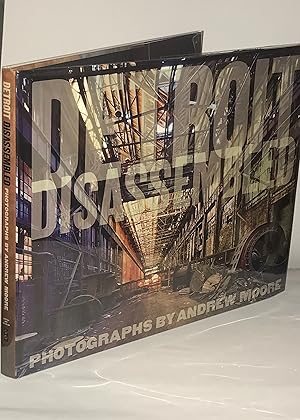Synopsis
No longer the Motor City of boom-time industry, the city of Detroit has fallen into an incredible state of dilapidation since the decline of the American auto industry after the Second World War. Today, whole sections of the city resemble a war zone, its once-spectacular architectural grandeur reduced to vacant ruins. In "Detroit Disassembled," photographer Andrew Moore records a territory in which the ordinary flow of time-or the forward march of the assembly line-appears to have been thrown spectacularly into reverse. For Moore, who throughout his career has been drawn to all that contradicts or seems to threaten America's postwar self-image (his previous projects include portraits of Cuba and Soviet Russia), Detroit's decline affirms the carnivorousness of our earth, as it seeps into and overruns the buildings of a city that once epitomized humankind's supposed supremacy. In "Detroit Disassembled," Moore locates both dignity and tragedy in the city's decline, among postapocalyptic landscapes of windowless grand hotels, vast barren factory floors, collapsing churches, offices carpeted in velvety moss and entire blocks reclaimed by prairie grass. Beyond their jawdropping content, Moore's photographs inevitably raise the uneasy question of the long-term future of a country in which such extreme degradation can exist unchecked.
À propos de l?auteur
Andrew Moore was born in Old Greenwich, Connecticut, in 1957 and lives in New York. His large format photography has been widely exhibited and is represented in numerous museum collections including the Whitney Museum of American Art, Los Angeles County Museum of Art, San Francisco Museum of Modern Art, Canadian Centre for Architecture, and Israel Museum. He has received grants from the National Endowment for the Humanities, New York State Council on the Arts, and Judith Rothschild Foundation. His film How to Draw a Bunny won a Special Jury Prize at the Sundance Film Festival. Moore's previous books include Inside Havana (2002), Governors Island (2005), and Russia: Beyond Utopia (2005). Philip Levine was born in Detroit, Michigan, in 1928 and divides his Lime between New York and California. He is the author of seventeen books of poetry including The Simple Truth (1994), which won the Pulitzer Prize; What Work Is (1991), which won the National Book Award; New Selected Poems (1991); Ashes: Poems New and Old (1979), which received the National Book Critics Circle Award and the National Book Award for Poetry; and 7 Years From Somewhere (1979), which won the National Book Critics Circle Award.
Les informations fournies dans la section « A propos du livre » peuvent faire référence à une autre édition de ce titre.



